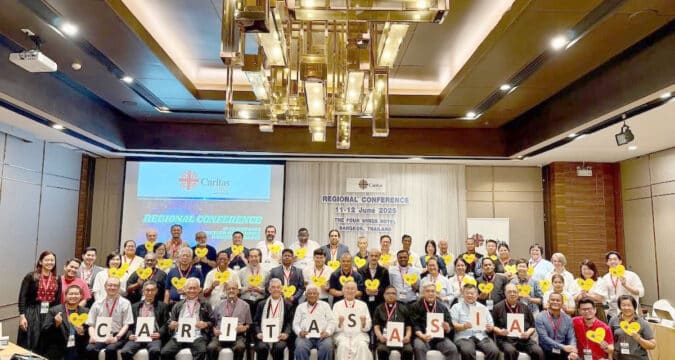
The Regional Conference of Caritas Asia was held in Bangkok, Thailand, from June 11 to 12. As always, the two days were an opportunity to talk and learn about a number of different issues, from a common strategy 2026-2030 to the one causing heavy headlines in the last days: the funding cuts.
Some guest speakers were invited, and the joy of getting reacquainted with familiar faces was palpable. You may know that Caritas, as a confederation of Catholic relief, development, and social service agencies, maintains its dedication to the cause of caring for the poor and promoting justice worldwide.
However, the current trends of reductions to funding impacting nonprofits, including those aligned with a faith community, pose drastic dangers to the future path of action and strategic agenda of the organisation. Our presence in Thailand enabled us to learn how we, as the Caritas family, can cope with these budget constraints while being true to our values and mission.
Laying out the challenges
Worldwide, nonprofits are facing difficult decisions as they weigh their options given reduced traditional funding. Budget reductions across services from local assistance to international aid are forcing charity organisations to re-examine their programmes and seek alternative funding sources.
For Caritas, this requires a strategic shift that balances financial realities with its unshakeable dedication to the needy.
…the current trends of reductions to funding impacting nonprofits, including those aligned with a faith community, pose drastic dangers to the future path of action and strategic agenda of the organisation…
Core mission and values
At its heart, Caritas is driven by Catholic social teaching values that emphasise the dignity of the human person, the common good, subsidiarity, and solidarity. Its mission is to help create a world in which poverty is alleviated, justice is upheld, and all people can live in dignity.
This involves providing humanitarian assistance, impacting policy reform, and assisting local communities to address their own concerns. Our dedication to this purpose was reaffirmed during the conference.

Strategic priorities in light of funding reductions
The following is how I understand the different talks and communications we received. In response to increasing financial constraints, Caritas is called to put the following strategic priorities first:
– Prioritisation of core services: Caritas has to perform holistic assessment of its programmes in order to determine and prioritise key services with the most significant impact for needy populations. This involves making tough decisions on scaling back or terminating some programs to ensure that the core services are robust.
– Diversification of funding sources: Recognising the risk of relying heavily on traditional funding sources or international funding, Caritas shall proactively diversify its funding sources. This entails fundraising endeavours from private donors, establishing partnerships with foundations, and exploring other sources of financing mechanisms.
Worldwide, nonprofits are facing difficult decisions as they weigh their options given reduced traditional funding. Budget reductions across services from local assistance to international aid are forcing charity organisations to re-examine their programmes and seek alternative funding sources
– Building stronger local partnerships: Caritas is compelled to put more emphasis on the importance of working with and through local partners, including community organisations, religious institutions, and grassroots movements. Through building stronger partnerships, Caritas can access local knowledge, resources, and networks to make the maximum impact out of its programmes.
These ideas from our friend Victor Genina, the director of Internal Human Development at Caritas Internationalis and guest speaker at the Regional Conference, make perfect sense in today’s ‘cutting’ context.
– Advocacy and awareness: Caritas recognises that addressing the roots of poverty and injustice involves change at the systemic level. Thus, it still calls for policies that promote social justice, protect the rights of the vulnerable, and address issues such as climate change, inequality, and conflict.
– Promoting innovation and efficiency: Innovation and efficiency are promoted for Caritas in its functioning for maximising impact from its resources. It means introducing new technology, and investing in the training and development of employees.
Transforming for the future
Resilience, flexibility, and strong resolve to continue with its mission are what the future of Caritas in a period of fund cuts requires.
I am reminded that prioritising core services, securing multiple funding sources, developing stronger local partnerships, advocating for policy changes, and promoting innovation while maintaining a strong connection to the Master of the Harvest will allow Caritas to weather these difficulties and continue to be a beacon of hope for the world’s most needy and vulnerable people.
Caritas recognises that addressing the roots of poverty and injustice involves change at the systemic level. Thus, it still calls for policies that promote social justice, protect the rights of the vulnerable, and address issues such as climate change, inequality, and conflict
Amid financial difficulties, Caritas remains steadfast in its purpose to promote charity and justice, living the mercy and love of Christ in a world that requires it.
A big thanks to the organizers and all those involved in the success of the Regional Conference.
Love in the service of hope.
Dominique Mukonda, CICM








